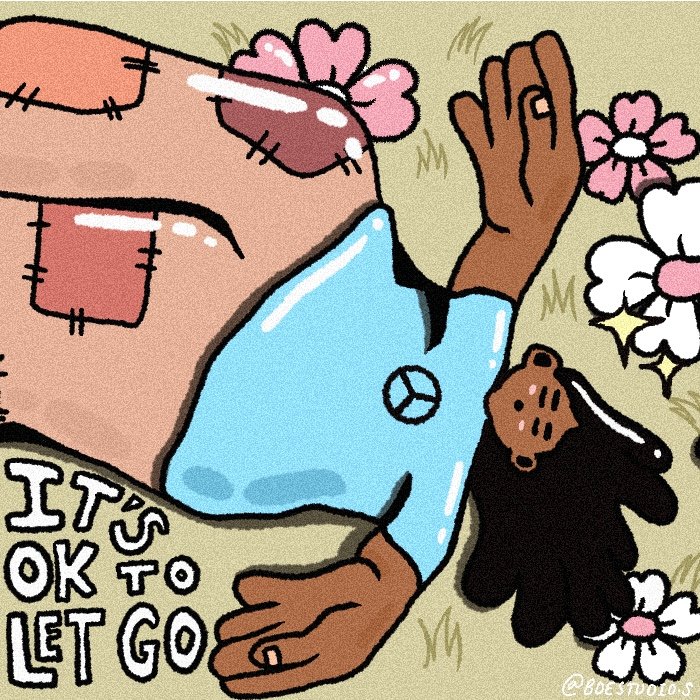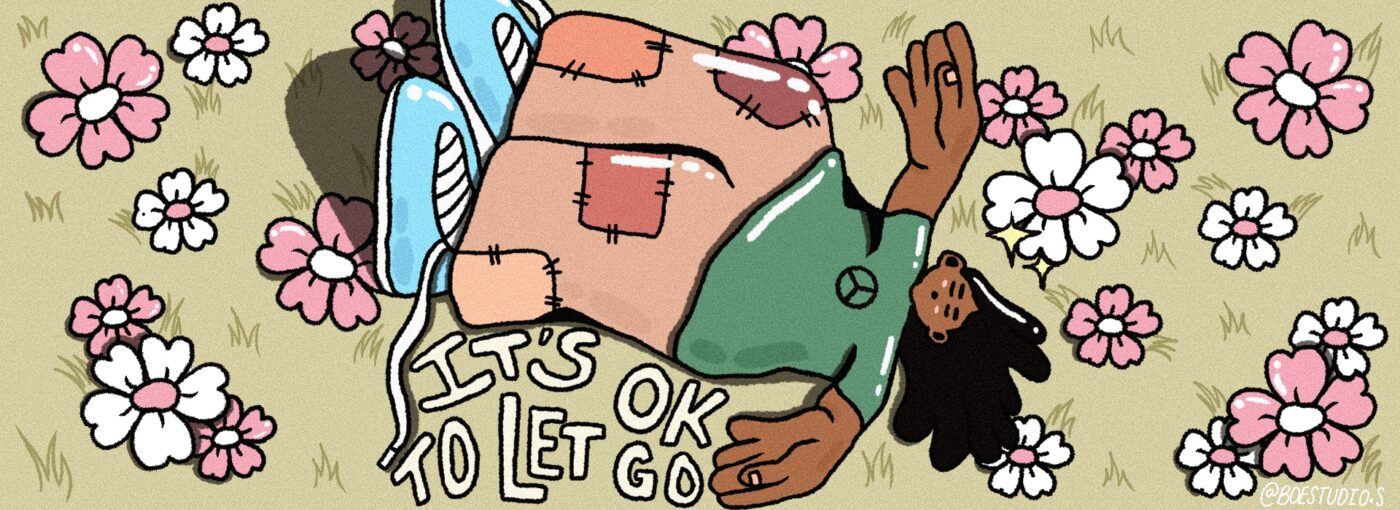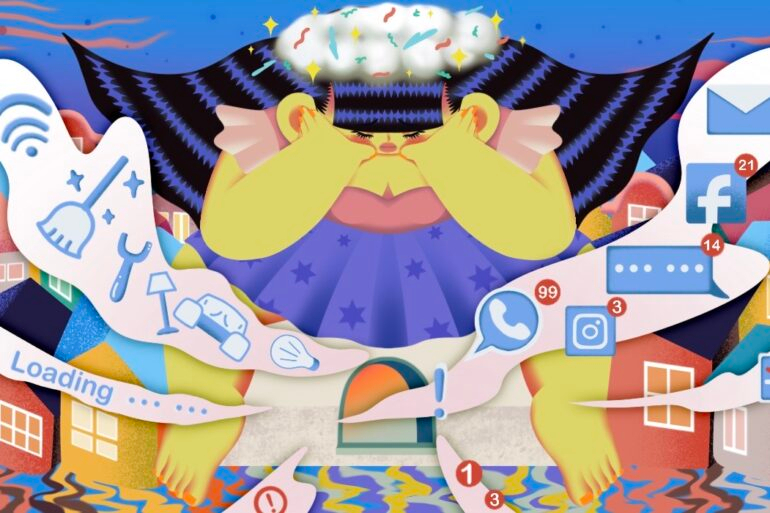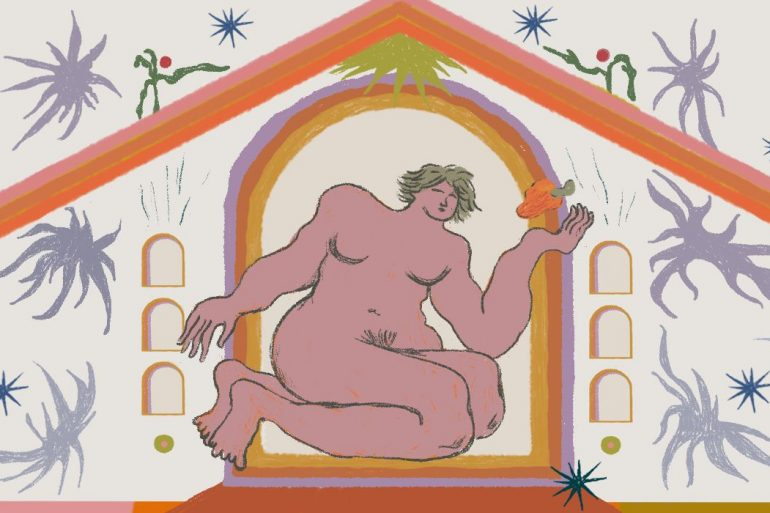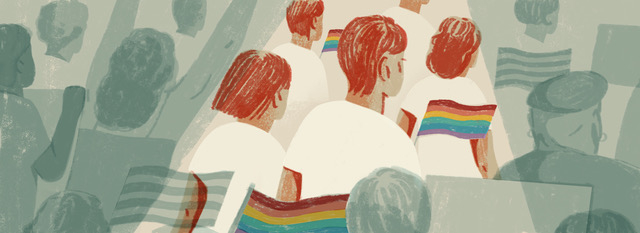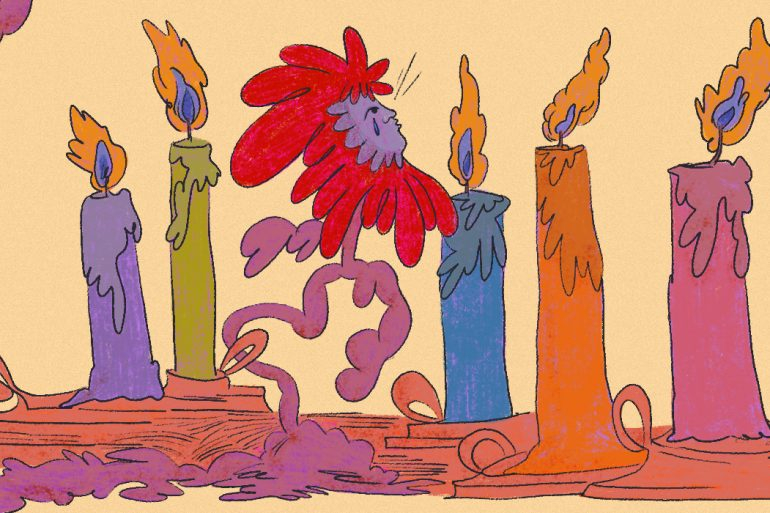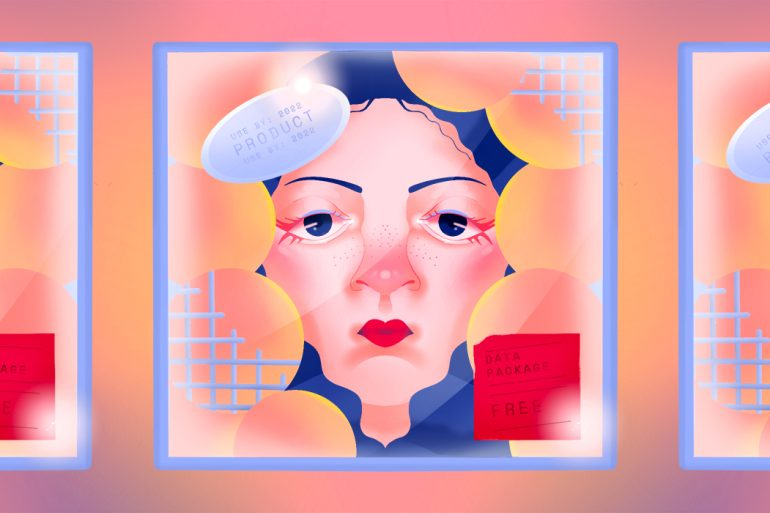I lived with my grandparents for a few years when I was a teenager, and although they loved me dearly in their own way, the experience was incredibly traumatic for a queer young person trying to figure out who they were.
I have vivid memories of the both of them groaning when the openly gay celebrity Stephen Fry appeared on the television: “they should all be shot” and “I miss the days when we’d castrate the lot of them,” were just a few of the phrases thrown at the screen. This attitude was also horrifyingly replicated in real life, anytime anyone queer was visible to them.
When I was 20, I came out as bisexual with defiance, writing them a long letter steadfastly explaining the whole thing and insisting that this wasn’t just a “phase.”
I expected a fight. What I didn’t expect was for my grandma to message me to tell me that she would never understand what I was experiencing, but that she would always love me. I believed her; we had been very close when I was a young child, bonding over a mutual love of books. She taught me how to read and write before I set foot in school, and happily took me into her spare room when I legged it from my parents’ at 14.
I dared to imagine that they’d grow to accept me, that this would cause them to rethink their bigotry. The next time I went to visit, I’d been showing them something with my laptop that had a bi pride sticker on it. I went to the loo and left the laptop, closed, on the living room table. When I came back, my grandma sat stiffly, statuesque, next to my laptop, which had been carefully turned over so it was upside down, the bi pride sticker hidden – if it couldn’t be seen, it didn’t exist.
Another time, I made a joke about coming out, and both my grandparents reacted with what seemed like genuine distress and pain. I had to come to terms with the fact that this was not something they could ever get past. It hurt, deeply.
The only reason they’d ‘allowed’ me to identify as bisexual was because they knew they’d be able to ignore it, that they could think of this as a hedonistic phase which would pass and that I’d eventually settle down with a man.
As it happened, I fell in love with a Jewish trans woman, and I knew there was no way I could ever put her in the position of meeting them.
When I was young, my grandparents complained endlessly that my father had married my mother, who was from a slightly poorer section of South Wales, blaming her for everything that went wrong in the family because she’d been born just 10 miles down the road. Their xenophobia and classism was so bad they wouldn’t even tolerate her, a white Welsh, Christian woman. So I certainly wasn’t going to introduce my partner to them. If they’d known that I was dating a trans person they almost certainly would have tried to interfere or separate us.
By this time I’d also realised I was trans, and I knew that if they’d struggled to cope with a bi pride sticker, they’d never manage seeing me in masculine clothes and sporting a beard. I kept my distance, which was easy because I was in England and they were at home in Wales. It felt natural to them that I wasn’t taking the two hour trip to see them – the other grandkids who lived in England barely saw them either.
It started to get more complicated when I moved back to Wales in 2018. By then, I was on testosterone and I’d been with my partner for almost two years. I went to visit them, and had to field loads of questions – about why my hair was so short, why I was so spotty, and why my voice sounded so strange.
They panicked, assuming I must be seriously ill, as my whole face seemed to have changed, but they couldn’t put their finger on it. They had both gotten markedly more frail now, my grandma barely able to hear or process anything I said to her. That visit cemented in my mind that I could never come out to them as trans.
My parents agreed, as they did with my decision not to tell them about my partner. Although we all decided that if they were to ask directly, we would not lie, but we knew that it was best for everyone if I kept my distance.
Then COVID-19 happened, and I had another reason not to visit. We exchanged occasional calls, but these grew less and less as they’d both worry about my voice. I heard through my aunty that they had assumed that my mental health medication had ruined my hormone balance.
I stopped calling, not wanting to add to any paranoia around mental health medications that they’d already picked up from the right wing newspapers that constantly sat on their kitchen table. By now, I texted them a couple of times a year.
In 2021, my top surgery was scheduled, and I knew that once I’d had my breasts removed, it would be a lot more difficult to visit them. I decided to visit them beforehand, feeling deep in my gut that it would be the last time I’d see at least one of them alive. I dug through my wardrobe looking for the most feminine clothes I owned, shaved off my beard and tried to contour away the effects that three years of T had had on my face.
They were both jubilant when they opened the door, squeezing me so hard that I could feel my spine clicking. We had lunch – my grandfather’s famous homemade chips, done in their new air fryer – and I sat with them for about an hour.
It was hard, because I couldn’t mention my work, my partner, my friends, and they were as horrible as ever outside of being pleased to see me. They seem unable to go five minutes without decrying “benefit scroungers”, “illegals” or “degenerate gays”.
I pushed back on their comments every time but they just laughed at me.
Between spats, somehow I made conversation, calmer than I’d expected myself to be. When it was time to go, I gave them both a quick kiss and didn’t linger.
Subscribe to shado's weekly newsletter
Exclusive event news, job and creative opportunities, first access to tickets and – just in case you missed them – our picks of the week, from inside shado and out.

On the bus home, I waited to cry. There were a few tears, yet they were not of sadness, but of relief. I was glad that I got to see them and say goodbye in my own way. How many people get to say a real goodbye to their grandparents and hug them knowing it’s the last time? I cherished that moment, and I also felt at peace knowing that they would remember me the way they’d want to.
Selfishly, I was also grateful that I wouldn’t have to spend time with them again – each visit reminds me of why I cut myself off. If anything, they’d gotten more extremist during the pandemic. Usually, after a visit, I have to spend the next two days trying to navigate severe trauma responses, but this time I felt lighter. I’d never be exposed to their evil comments again, and as sick as it made me feel, I was glad my relationship was over with them once and for all.
Of course, they didn’t know that that would be the last time they saw me. In the last year and a half, they’ve asked my parents about me often, wondering why I haven’t come back, wondering why I’m too busy to pop on the bus for 15 minutes to go and see them.
When my dad and I took a trip to Ikea last weekend, he mentioned that they were both worried about me, and were asking to see me. My grandma is barely eating and keeps falling asleep mid conversation. I asked if he really wanted me to go and see them, and he said no. I wondered what exactly he did want – perhaps he just wanted to be reassured that it was better this way, that the shock of me looking the way I do now would do a lot more harm than good.
I cried more that afternoon, when I got home, than I had when I went on that last visit. I remembered being a teenager, and my grandma worrying about one of my cousins. She’d been very close to my cousin when they were a child, but as an adult they had grown distant.
What my grandma didn’t know was that my cousin was queer. It seemed to haunt her, and she’d constantly question what she’d done to push my cousin away. She asked me, a lot, if she was a bad grandmother. I lied, and said no. I could never bring myself to tell her that her extreme bigotry had isolated her. None of us could. She begged me to never let our relationship grow apart as it had with my cousin. I promised to never abandon her in her old age, and at the time, I truly meant it.
That’s the hardest part of this situation – my grandma almost certainly thinks that I broke my promise because I’d never intended to keep it. The truth is, I broke my promise because she forced me to with her toxic, hateful behaviour.
My whole extended family lives in fear of upsetting her and my grandfather, and it’s tragic to me that they will never realise, and never become self aware enough to grow as people. Love is meant to conquer all, but in the case of my grandparents, love was never enough to overcome their wickedness.
I simultaneously hate them and love them. In my teens and early twenties, I would get into shouting matches with my grandfather about politics, about his bigotry, and everything else I find repulsive about his and my grandma’s worldviews. They always attributed it to my age and lack of real-world experience, consistently telling me that I would be like them when I “grew up.” It terrified me, and it gave me a drive to be different to them.
At some point, I had to accept that I could not argue or debate them out of their beliefs – they were too far gone. Instead I had to learn to divest emotionally, and to put the energy I had previously used bashing my head against the proverbial wall of their bullshit into something that would actually support the marginalised people that my grandparents hated so much. I went on to become an activist, helping set up a mutual aid network for trans people and campaign for an end to homelessness in the LGBTQI+ community, and I guess in a strange way I have them to thank for that.
It is easier for them this way, and maybe it’s letting them off too easily – my younger self would certainly think so – but it’s also easier for me. I don’t have to live the same heartbreak that I did in the years when I desperately wanted them to accept me as I was and showed it by screaming bloody murder at them.
Years of therapy have taught me that I shouldn’t traumatise myself to make a point that will never be heard. Their lack of access to their grandchildren, I hope, serves as punishment for their hate, and I dare to dream that it will occur to them someday that that is why none of us go to visit them.
Over the past few days, I’ve got to thinking about what happens when one of them dies – how I’d have to come up with a plan for going to the funeral, how I’d have to face it without my partner to support me, how I’d have to keep my distance even then to avoid getting clocked by the surviving grandparent. That hurts the most.
For the last few years I’ve taken comfort in knowing that they will die without ever truly hating me, and that one day I wouldn’t have to be worried about being outed to them somehow – but I didn’t give much thought to how I’d navigate the days after they leave this world. I tried to work out some plans with my friends, with schemes as ridiculous as borrowing a drag queen friend’s breastplate thrown into the mix.
My life would be so alien to them now. I desperately tried to think of a resolution, but I had to realise again that my decision to keep my distance was the right one, the easiest one, the most gentle one for everyone. And it was what I had to continue to do. For so long, I’ve wanted to make sure they were okay – after all, they loved me in their own way. They took me in when I ran away, they always made sure I had good food to eat, bought me clothes that made them think of me, recorded programmes they thought I’d like. But it was always conditional, and it left me with lifelong scars. And I think I finally got it through my head that they have never extended any effort to consider my feelings or my comfort, and that it is past time that I matched that energy.
When I conceived of this article, it was going to be about my guilt around abandoning my grandparents, but as I sat and wrote and reflected my guilt eased, replaced by grief for what could have been.
When I see loving grandparents supporting their families unconditionally, it feels both like an ache and a balm. I think I’ll always carry at least some grief around missing unconditional love from my grandparents, but it helps to know that there are grandparents out there accepting and championing marginalised members of their families.
I didn’t abandon my grandparents – they failed me. They failed me as a teenager, and they failed me as an adult. I could never do anything other than leave them behind.
That doesn’t mean that it doesn’t hurt.
What can you do?
Bigotry in families is very common. Here are some things other people have said on the subject.
Watch:
Read:
- I’m Trans and I Don’t Care If I Don’t See My Family This Christmas
- A Letter To My Racist In-Laws
- The Transgender Issue by Shon Faye
- More articles by Rudy HERE
Transphobia in the UK is at an all-time high, with the UK Government making unprecedented moves to suppress Scotland’s decision-making powers. You can read about it here and get involved in resisting this decision by following activist groups such as London Trans Pride, ScottishTrans and Trans Aid Cymru. Trans Radio is also keeping a running list of pro-trans protests here.
